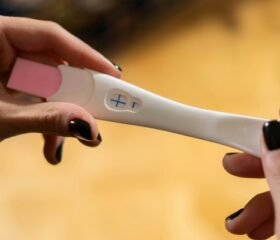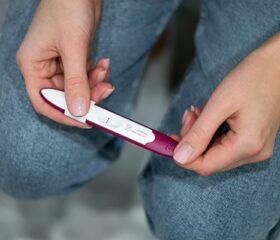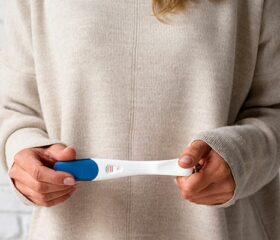How Early Can You (Accurately) Take a Pregnancy Test?
When you’re trying to have a baby, the wait before you can take a pregnancy test can feel like an eternity.
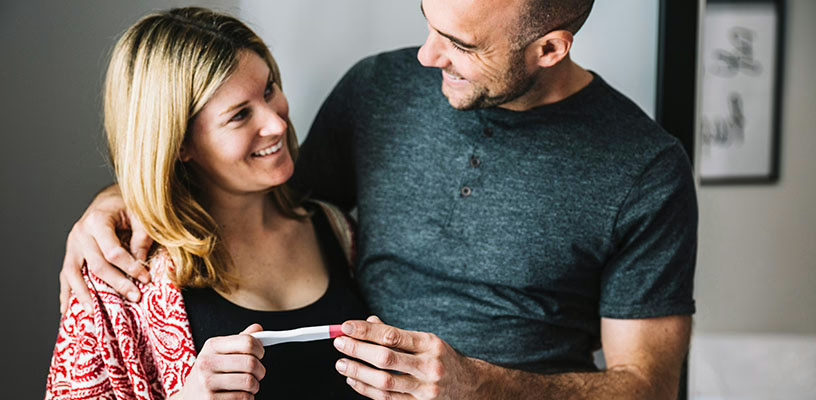
While modern pregnancy tests are more sensitive than ever before, testing too early can still give you misleading results. Let’s look at how pregnancy tests work, why the time when you take one matters, and what the earliest possible time you can take one is.
What’s the earliest you can take a pregnancy test?
Most experts recommend waiting until the date of your next expected period to take a pregnancy test. In fact, a missed period is usually the first sign that prompts women to test for pregnancy.
However, depending on the kind of pregnancy test you use, it may technically be possible to find out earlier. There are two types of tests:
1. Home pregnancy tests (urine tests)
When it comes to at-home pregnancy tests (the kind you can buy at the pharmacy), the earliest that most can detect pregnancy is about 10 days after conception. 1
However, that’s quite early, and there’s a big chance you’ll get a false negative, meaning the test will say you aren’t pregnant but it later turns out that you are.
Put another way, it’s possible to get a positive test that early, but if you get a negative one, you can’t really draw any conclusions from that.
Be careful with early detection pregnancy tests
Some pregnancy tests are marketed as “early detection tests.” They claim that you can find out if you’re pregnant a few days before you’d have your next period. However, these tests are less accurate, and there’s still a good chance you’ll get a false negative result. 2
2. Blood tests
If you’re desperate to find out sooner rather than later, then a blood test performed by your doctor is the best way to determine whether or not you’re pregnant. With one of these, you can find out between 7 and 10 days after conception. 1
These tests aren’t generally available over the counter. If you want one, you’ll probably have to visit a doctor.
Testing too early can lead to an unclear result
If you take an at-home pregnancy test too early, you might get an ambiguous result. A faint line on your pregnancy test is usually a positive result (meaning you’re pregnant). If you test again in a few days, the line will probably have grown noticeably darker, confirming it.
Why you should wait until your next expected period to test for pregnancy
At-home pregnancy tests and the more sensitive blood tests your doctor uses both look for a certain hormone: human chorionic gonadotropin (hCG).
hCG is often called the “pregnancy hormone” because your body begins producing it almost immediately after implantation occurs (when a fertilized egg implants in your uterine lining). When you’re pregnant, by the time your next period would have normally shown up, your levels of hCG should be high enough to show up on a test.
Since ovulation (when one of your ovaries releases a mature egg that’s ready to be fertilized) and implantation don’t always follow a predictable schedule, waiting until the date of your next period accounts for any variability in timing. 3
What are the dangers of testing too early?
Again, if you test too early, you’re likely to get a false negative result, which could cause you to skip out on important prenatal care, like taking vitamins or making lifestyle adjustments (e.g., cutting out wine and other alcohol while you’re pregnant).
Moreover, while waiting to take a pregnancy test can be anxiety-inducing, you can easily end up causing yourself more stress by testing too early and getting a false result.
When should you test if your periods are irregular?
Determining when to test for pregnancy with irregular periods is tricky. It’s hard to use a missed period as a sign to test when you aren’t sure when your next expected period will be.
If you have an irregular cycle, try counting 3–4 weeks from the date you last had unprotected sex, or 36 days from the date of your last period. If you’re trying to conceive and have been tracking your ovulation (e.g., by using ovulation test strips), you can test 2–3 weeks after your suspected ovulation date.
How early can you develop pregnancy symptoms?
Although a missed period is often the sign that prompts many women to take a test, it is possible to have pregnancy symptoms as early as a few days after conception. 4
The most common very early pregnancy symptom tends to be breast pain or tenderness, which can show up between 1 and 2 weeks after conception. 5
Note that this symptom can also be the result of premenstrual syndrome (PMS). It can be tricky to tell the difference between PMS and pregnancy symptoms, but PMS-related breast tenderness tends to show up later than it does when it’s caused by pregnancy (usually just before your period is due).
A heightened sense of smell during pregnancy is also common. Some women notice that their sense of smell is stronger as early as a few days after conception. 6
How to take an at-home pregnancy test
For most home tests, you’ll either need to place the pregnancy test strip in a sample of your pee or stick the test directly into your urine stream (whichever your device’s instructions indicate).
Home pregnancy tests usually have a control line (which shows the test is working) and a test line. When you get a positive result, you’ll see the control line and test line. With a negative result, only the control line will be visible.
There are also digital tests that display a clear sign like “pregnant” or “not pregnant,” or a smiley face for a positive result.
Factors that affect how accurate your home pregnancy test is
Pregnancy tests are generally very accurate, and user error is the main reason that people sometimes get inaccurate results. Testing too early is probably the most common mistake that people make.
You could also get false negative results if:
- Your urine is too diluted: Another common error many users make is drinking too many fluids before taking the test. This can dilute the hCG in your urine too much for it to show up on a test. Experts recommend testing first thing in the morning, when hCG tends to be more concentrated.
- You use an expired test: If your pregnancy test is expired, it may not work properly. Always check the expiration date before using it, and store it out of direct sunlight.
If you get a negative result on your pregnancy test but are still convinced you’re pregnant (e.g., you’re experiencing early pregnancy symptoms), you can always test again at a later date or book a blood test with your doctor.
Are false positives possible with home pregnancy tests?
False positives are very rare with home pregnancy tests, but they’re not unheard of. They can be caused by manufacturing defects, as well as certain medications. For instance, some fertility treatments involve hCG injections, and if you test too soon after a shot, you’ll get a false positive. To avoid this, you should wait at least two weeks after your last hCG injection to test. 7
Moreover, if you recently had a miscarriage or a chemical pregnancy (a pregnancy loss that happens before it can be detected on an ultrasound), you may still have hCG levels that are high enough to show up on a pregnancy test, even though you’re no longer pregnant. 7
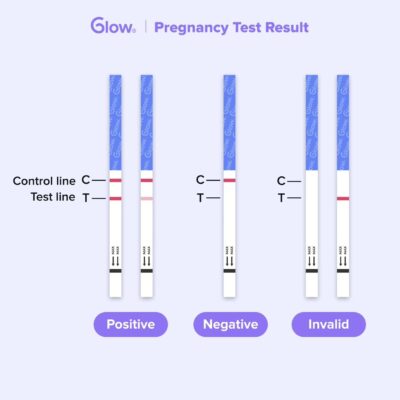
What to do if you get a positive result on your pregnancy test
If you get a positive result on your pregnancy test, your next step should be to chat with your doctor about the next steps. Whatever avenue you decide to pursue, they’ll be on hand to guide you.
Starting prenatal care
Assuming you plan to continue the pregnancy, you’ll need to get started on your prenatal care as soon as possible.
You should schedule your first pregnancy appointment when you’re between 6 and 8 weeks pregnant (2–4 weeks after your missed period).
Your doctor will let you know which lifestyle adjustments to make, give you a general timeline of your next appointments and ultrasounds, and get you started on prenatal vitamins.
Final thoughts
It’s understandable if you want answers as soon as possible, but testing for pregnancy too early may only mislead you. Booking a blood test with your doctor is the earliest way to find out, but for most people, the best move is to play the waiting game for just a little longer, until the time you expect your next period to show up.
Article Sources
- Cleveland Clinic. "Pregnancy Tests" Retrieved June 18, 2025.
- Planned Parenthood. "Pregnancy Tests" Retrieved June 18, 2025.
- UT Southwestern Medical Center. "How early can home pregnancy tests show positive results?" Retrieved June 18, 2025.
- Cleveland Clinic. "Am I Pregnant?" Retrieved June 18, 2025.
- MedicalNewsToday. "How to tell the difference between PMS and pregnancy symptoms" Retrieved June 18, 2025.
- Texas Health Resources. "Early Signs of Pregnancy" Retrieved June 18, 2025.
- Cleveland Clinic. "Causes of a False Positive Pregnancy Test" Retrieved June 18, 2025.
